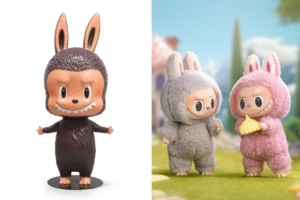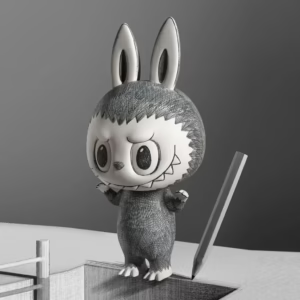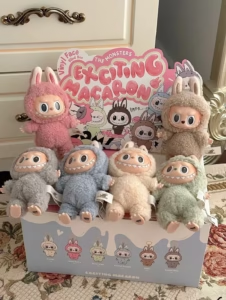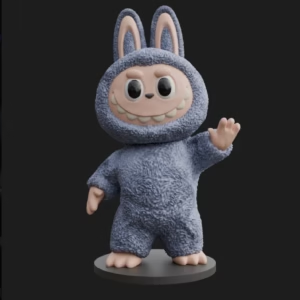Labubu Unmasked: The Darkly Cute Toy Taking Asia by Storm
LABUBU
The Art Toy Phenomenon That Redefined Collectible Culture
From underground art to global obsession: The story of a one-eyed wonder
Cultural Impact
Unique Designs
Record Sale Price
Global Collectors
In the world of designer toys, where thousands of vinyl creations compete for collectors’ attention, Labubu stands apart as a cultural phenomenon that transcends the art toy scene. This strange creature with a single eye and mischievous grin has evolved from an underground Hong Kong art project to a global obsession, with rare pieces selling for hundreds of thousands of dollars and inspiring devoted communities worldwide.
This comprehensive guide dives deep into the magical universe of Labubu, exploring its artistic origins, cultural impact, design philosophy, and the passionate community that has made it one of the most significant art toy phenomena of the 21st century. Whether you’re a seasoned collector or discovering Labubu for the first time, prepare to enter a world where art, storytelling, and collectible culture collide.
The World of Labubu



Origins: From Artist’s Mind to Global Icon
Labubu emerged from the imagination of Hong Kong-based artist Kasing Lung, who began his artistic journey as a graphic designer before venturing into the world of three-dimensional art. Born in 1983, Lung developed a passion for drawing and character design from an early age, influenced by Japanese manga, street culture, and traditional Chinese folklore.
In 2006, Lung founded his art brand “Labubu,” naming it after a mischievous forest spirit from Tibetan mythology. The first Labubu figure was a hand-painted resin prototype that Lung created for a small art show in Hong Kong. With its distinctive single eye, sharp teeth, and ambiguous expression that mixed innocence with mischief, the character immediately stood out in the burgeoning designer toy scene.
The early years saw Labubu as an underground phenomenon, with Lung producing limited runs of 10-50 pieces per design, each meticulously hand-painted. The turning point came in 2010 when Lung partnered with Japanese toy giant Medicom Toy to produce the first mass-market Labubu figures under their Bearbrick line, introducing the character to a global audience.
Birth of an Icon
Kasing Lung creates the first Labubu prototype for a small Hong Kong art exhibition. The initial design features the distinctive single eye and mischievous expression that would become iconic.
Global Expansion
Partnership with Medicom Toy brings Labubu to the international stage. First mass-produced vinyl figures sell out worldwide within hours, establishing Labubu as a major player in designer toys.
Cultural Phenomenon
Dedicated Labubu exhibitions in Tokyo, Taipei, and New York attract thousands. Online collector communities explode on social media platforms.
Mainstream Recognition
Collaborations with Nike, Sony, and luxury fashion brands. Museum exhibitions and academic studies on Labubu’s cultural impact. Record-breaking auction prices for rare pieces.
Design Philosophy: Why We Love Labubu
The genius of Labubu lies in its paradoxical design that balances multiple emotional resonances. Kasing Lung has described Labubu as representing “the innocent child within all of us” – that part of ourselves that retains curiosity, playfulness, and wonder despite life’s challenges.
Key elements of Labubu’s design and their symbolism:
- The Singular Eye: Represents focused perspective, encouraging viewers to see the world with childlike wonder rather than preconceived notions
- Sharp Teeth: Symbolize the hidden strength within innocence and the duality of human nature
- Rounded Body: Creates approachability while suggesting hidden depths beneath a simple exterior
- Ambiguous Expression: Allows viewers to project their own emotions onto the character
- Minimalist Color Palettes: Often monochromatic schemes focus attention on form and texture
This design philosophy creates an emotional complexity that resonates deeply with collectors. As Lung explains: “Labubu isn’t cute in the traditional sense. It occupies that fascinating space between adorable and unsettling, which makes people want to look closer and understand what they’re feeling when they see it.”

Collector’s Guide: From Beginner to Expert
Navigating the world of Labubu collecting can be daunting with hundreds of releases and variations. This comprehensive guide will help you build and curate an impressive collection:
Understanding the Market
Learn to distinguish between mass-produced releases, limited editions, artist proofs, and exhibition exclusives. Market values can range from $50 to over $250,000 based on rarity and provenance.
Authenticity Verification
With rising values, counterfeit Labubus have appeared. Learn to identify genuine pieces through mold lines, paint quality, and official markings. Always request certificates of authenticity for high-value purchases.
Community Engagement
Join dedicated Labubu forums and social media groups. Attend designer toy conventions. The community is invaluable for trading, verifying authenticity, and accessing rare pieces.
Preservation Techniques
Protect your investment with UV-resistant display cases, climate control, and proper cleaning methods. Avoid direct sunlight and extreme temperatures that can damage vinyl and paint.
Essential Labubu Resources
Collector Communities
Labubu Collectors Worldwide Forum and Marketplace
The Enduring Magic of Labubu
In just over fifteen years, Labubu has evolved from a niche art project to a global cultural phenomenon that transcends the designer toy scene. Its unique blend of artistic integrity, emotional complexity, and collectible appeal has created a dedicated following that continues to grow.
What makes Labubu truly special is its ability to connect with people on multiple levels. To some, it’s a sophisticated art piece; to others, a beloved character; and to many, a meaningful symbol of maintaining childlike wonder in an increasingly complex world. As Kasing Lung himself puts it: “Labubu is a mirror – people see in it what they need to see. That’s why it belongs to everyone now.”
As we look to the future, with new collaborations, exhibitions, and interpretations continually emerging, one thing is certain: the one-eyed wonder from Hong Kong has secured its place in art history, and its journey is far from over.
Share this content:






1 comment